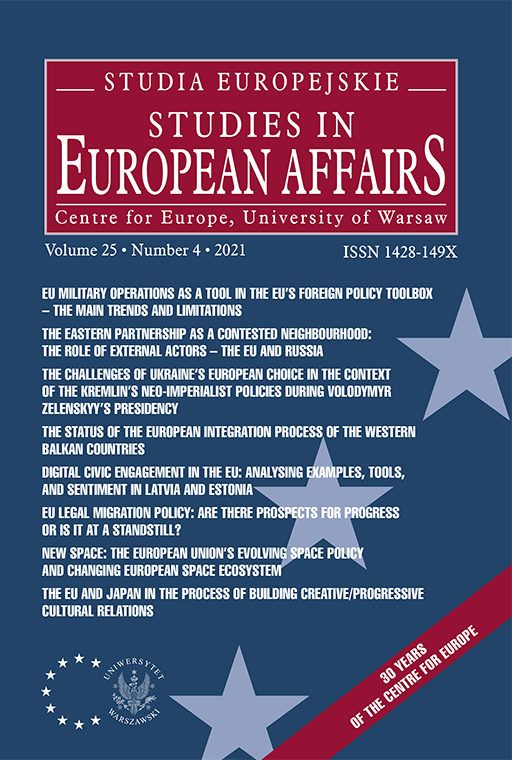
ISSUE: 4/2021
- Volume 25
- Number 4
- 2021
Subscribe NEWSLETTER
Studia Europejskie –
Studies in European Affairs
ISSN: 1428-149X
e-ISSN: 2719-3780
License
Articles published in the journal are under a Creative Commons Attribution – Non Commercial – No Derivatives 4.0 International License
Digital Civic Engagement in the EU: Analysing Examples, Tools, and Sentiment in Latvia and Estonia
Abstract
The decline of civic engagement has been an issue for several EU Member States. To promote civic engagement, digital tools have been perceived as one of the possible solutions both at the EU and national levels. Within the context of the COVID-19 pandemic that has intensifi ed digitalisation in many forms and sectors, the issue of digital solutions for civic engagement has regained its relevance and topicality. In the last decade, Latvia has been among other EU Member States in which civic engagement has become a concerning and long-term challenge. For instance, as opposed to Estonia, voter turnout in the most recent national and European parliamentary elections has gradually declined in Latvia. There are also limited digital possibilities through which Latvian society can participate and infl uence the political agenda daily. Therefore, this article provides an overview of the provisions and guidelines at the EU level to address the issue of civic engagement by promoting digital democracy tools. Secondly, it analyses what digital tools exist in Latvia to promote civic engagement. Thirdly, by comparing the digital civic engagement solutions implemented in Estonia and Latvia, the lessons learned are drawn. Finally, using data from quantitative (polls) studies (before and during the COVID-19 pandemic), the article provides recommendations for Latvia in the context of I-voting.
References
Adler R.P., Goggin J., What Do We Mean By Civic Engagement, “Journal of Transformative Education”, no. 3(3)/2005, DOI: https://doi.org/10.1177/1541344605276792.
Berger B., Political Theory, Political Science, and the End of Civic Engagement, “Perspectives on Politics”, no. 7(2)/2009, DOI: https://doi.org/10.1017/S153759270909080X.
Budge I. The New Challenge of Direct Democracy, Polity Press, Cambridge 1996.
Carstens K., Greeks reach out through e-Vote project, https://www.politico.eu/article/greeks-reach-out-through-e-vote-project/ (access 1.05.2021).
van Dijk J., Digital Democracy: Vision and Reality, in: Public Administration in the Information Age: Revisited, eds. I. Snellen, M. Thaens, W. van de Donk, IOS Press, Amsterdam 2012.
e-Estonia i-Voting – the Future of Elections?, https://e-estonia.com/i-votingthe-future-of-elections/ (access 2.04.2021).
Ekman J., Amna E., Political Participation and Civic Engagement: Towards a New Typology, “Human Affairs” 2012, DOI: https://doi.org/10.2478/s13374-012-0024-1.
EU eGovernment Action Plan 2016–2020 Accelerating the digital transformation of government, COM(2016) 0179, Brussels (access 19.04.2016).
EU eGovernment Report 2016, European Comission’s report (2016), https://digital-strategy.ec.europa.eu/en/news/eu-egovernment-report-2016-shows-online-public-services-improved-unevenly (access 17.05.2021).
Hacker Kenneth L., van Dijk J., Digital Democracy: Issues of Theory and Practice, Sage, London 2000.
Lindner R., Aicholzer G., E-Democracy: Conceptual Foundations and Recent Trends, in European E-Democracy, in: L. Hennen, Practice, Studies in Digital Politics and Governance, Sage Publication, New
York 2000 (Online publication date 31.12.2012), DOI: https://doi.org/10.4135/9781446218891.
Putnam R.D., Bowling Alone: Democracy in America at Century’s End, in: A. Hadenius, Democracy’s Victory and Crises, Cambridge University Press, Cambridge 1997, DOI: https://doi.org/10.1017/CBO9780511558832.003.
Rabia Karakaya P., The Internet, and Political Participation, “European Journal of Communication”, no. 20(4)/2005, DOI: https://doi.org/10.1177/0267323105058251.
Karel S., Remote Internet Voting: Happy Coincidence or Fact? The Case of Estonia, “Masaryk University Journal of Law and Technology”, no. 9(2)/2015.
Shaping Europe’s Digital Future, European Commissions paper, https://ec.europa.eu/info/sites/default/fi les/communication-shaping-europesdigital-future-feb2020_en_4.pdf (access 17.05.2021).
Smith A., Civic Engagement in the Digital Age, Pew Research Center, 2013, https://www.pewresearch.org/internet/2013/04/25/civic-engagementin-the-digital-age/ (access 7.08.2021)
Timmer P., Agenda for eDemocracy – an EU perspective, European Commission, https://agora-parl.org/sites/default/fi les/agora-documents/EC%20-%20Agenda%20for%20eDemocracy%20-20EN%20-%20PI.pdf (access 21.08.2021).
Toots M., Why E-participation systems fail: The case of Estonia’s Salee.ee, “Government Information Quarterly”, no. 36(3)/2009, DOI: https://doi.org/10.1016/j.giq.2019.02.002.
Unt T., Solvak M., Vassil K., Does Internet voting make elections less social? Group voting patterns in Estonian e-voting log fi les (2013–2015), “PLOS ONE”, no. 12(5)/2017, DOI: https://doi.org/10.1371/journal.
pone.0177864.
Vassil K. et al., The diffusion of internet voting. Usage patterns of internet voting in Estonia between 2005 and 2015, “Government Information Quarterly”, no. 33(3)/2016, DOI: https://doi.org/10.1016/j.giq.2016.06.007.
Wigartz T., Does Internet Voting in Estonia Affect Voter Turnout?, Master Thesis supervised by Annika Lindskog, University of Gothenburg, Gothenburg 2017.
DOI: 10.33067/SE.4.2021.5
Language: English
Pages: 83-97
How to Cite:
Harvard
Vargulis, M. (2021) "Digital Civic Engagement in the EU: Analysing Examples, Tools, and Sentiment in Latvia and Estonia". Studia Europejskie – Studies in European Affairs, 4/2021, pp. 83-97. DOI: 10.33067/SE.4.2021.5